- Home
- Lisa Wingate
The Tidewater Sisters: Postlude to The Prayer Box Page 6
The Tidewater Sisters: Postlude to The Prayer Box Read online
Page 6
“Wow . . . kids . . .” He draws back a little. “You have one who’s fifteen?”
“I got pregnant my first year in college. It’s not a real pretty story.” So many things aren’t, but if this last year has taught me anything, it’s that God has the capacity to make incredible things from our mistakes. Zoey is incredible. “That’s enough about me. Tell me about you. Tell me where you’ve been.” I try to imagine what he’ll say. Will he describe heaven? Or in this dream, has he gone on and lived a regular life? He did say he’d been lots of places. What does that mean?
A bank of clouds further dampens the sun, and he turns his shoulder to me, resting his elbows on his knees and letting his head fall forward. His shoulders hollow out an arc, the chambray fabric settling over them.
I want to lay a hand there, and I don’t even know why. The dog circumvents me and curls up beside Luke on the porch step, his face resting on the black dirt stains that tint Luke’s work jeans.
“It’s not the prettiest picture either. You know, after the accident, when they finally dialed back the meds and I came to, Laura was in a wheelchair, and my parents had spent almost everything they had, paying the medical bills, and it was all my fault. I just couldn’t . . . deal with what I’d done.”
A long breath shudders out. He strokes the dog’s soft coat, studies the field. “I didn’t make very good use of the second chance at life. When you’re running from things, you never do. You spend all your energy on pointless movement. You don’t have anything left to build with. I moved here and moved there, worked on a shrimp boat, did some seasons at ski resorts and national parks, went through a stint as an Army Ranger and tried my best to get myself killed, came home off and on and helped with the farm. I wanted to do what I could to make it up to Laura, not that she ever told me I needed to. But I was the one driving the truck that day.” He casts a sad look my way, as if he desperately wants to know what I’m thinking, as if he needs to know. “I was always glad you weren’t in it.”
My head reels so wildly that I can’t even answer. Reality doesn’t just seep in, it floods. I’m underwater for a moment, gasping for air. “They told me you died” is all I can manage.
Bright-blue eyes blink, stare, and blink again. “They what?”
“When we left here that summer, you weren’t expected to survive.” The news had been all over Mulberry Run Road. I can still hear my grandparents talking about what a tragic thing it was. “Sometime after that, my father told me you were gone. My parents were in a custody fight with my grandparents by then, and Daddy wouldn’t even bring us back here for the funeral.”
His brows rise and hover. I can see his thoughts moving. “Well . . . the doctors did tell my parents to be prepared. They’d had the talk about organ donation. But you know, doctors aren’t always right. Sometimes it doesn’t happen like they expect. By the fourth or fifth day, and the fourth or fifth surgery, they thought I might make it after all.”
He goes on and describes what he survived as a sixteen-year-old and what his family went through, with two kids facing months and years of follow-up surgeries and physical therapy. I try to imagine as if it were Zoey and J.T., but I can’t.
I keep thinking, By the fourth or fifth day . . . they thought I might make it. . . .
It was well after that when my father, frustrated with my tears and professions of love for Luke and pleas to return to the farm, said something like, Shut up about it already. That Townley kid died a couple days ago. I didn’t tell you because I knew you’d be all broke up. You’re thirteen. You don’t even know what love is. I don’t wanna hear about that Townley kid no more, you get me? Just leave it go. . . .
By the time Luke’s story ends with his leaving home at seventeen, the dog is chasing the leftover banana MoonPie down the steps. I must’ve dropped it.
“Boomer,” Luke scolds. “Get away from . . . well, too late.” He aims a shrug my way, seeming ready to lighten the gravity of our conversation.
“Boomer,” I repeat. “That’s not the Boomer?”
“Of course not. He’d be, like, twenty-five by now. But your grandpa’s dog got around, if you know what I mean. You could say his legacy lives on.” Luke’s lips quirk in a way that is so familiar. I suddenly remember that first kiss in the mulberry orchard. I remember everything about it.
That kiss both rocked the world and changed it in the way that first kisses so often do. When Luke Townley kissed me, I thought I knew, right then and there, what my future would be.
We planned it all out together, lying side by side beneath the mulberry trees.
Now, looking at him, I wonder . . . Does he remember the promises we made?
CHAPTER 7
“Well, I’ve definitely never seen anything like it,” Luke says, closing the lid on the tobacco tin and handing it back to me. We’re standing in the backyard, just sort of hovering near my SUV.
He’s helped me carry things from the house, then wrap and pad and pack them into the cargo area. Together, we’ve sorted through the last few rooms—and through a hundred different memories. He has reminded me of so many moments I’ve forgotten, and I’ve unearthed touchstones he’d lost as well. Our off-and-on childhood friendship feels as real as if we had just seen one another yesterday. Perhaps that is where its magic lies. The misty, impractical hues of childhood sprinkle glitter over everything.
Neither of us talks about the bad parts. We don’t discuss my father, roaring drunk in the yard, as he and my mother have yet another shoving match, and she tells him once again to get out, and Pap-pap bursts onto the porch with his rifle. We don’t discuss Luke and me making plans to run away together, promising each other forever as mere teenagers, having no concept of how complicated forever can be.
Neither of us mentions that volatile, sweet-then-bitter last summer at all. We’ve just spent the last hours of daylight sorting, carrying, and reminiscing back and forth from room to room, sometimes laughing so hard we’re in tears.
Even Boomer looks at us like we’ve lost it. It’s true, we have. We’ve lost all the intervening years, all the pain and disappointment, all the adult worries that weigh us down and keep us from launching into flights of fancy.
A few times I’ve let my mind stray into what if. What if my parents hadn’t dragged me away that first week of August? What if hopes and first love could’ve taken care of me the way Luke promised they would? What if, instead of running from his pain, Luke had gone on to college and become the thing he always said he would be, a veterinarian?
What if Zoey and J.T. were his, and we had lived all our lives together in some little house in the Tidewater or by the shore?
But I curtail the wondering each time it comes, and I close the door on it again as we stand beside the car, neither one of us seeming quite ready to leave. I know I should. Just being here, just thinking these thoughts, feels disloyal to Paul in some way. I know the only reason he hasn’t called to check on me is that he thinks I’m in a motel somewhere, catching up on my sleep. He’s being what he always is—a protector, a best friend, a hero, the first person I’ve ever known who loved me just for me.
Even Luke’s love wanted something, back in the day. I’d overheard Pap-pap warning Gina about what a boy’s love could want, after she was caught sneaking around with Luke’s older brother. You watch out for that Townley boy. Not a whole lotta difference between a young rounder and the yard dog. You stand in front a one with steak on a plate, he’ll be your best friend, long’s the steak’s still on the plate. You let him empty the plate, and he’ll be gone soon’s some other girl walks by with a platter in her hand.
The analogy makes me chuckle now, but it also makes me wonder. Did Luke mean all the things he said back then, or was that just teenage hormones talking?
Maybe it’s a mercy that there was never a chance for my illusion to be shattered. Maybe it’s good when a first love remains the fairy tale you always believe in.
Opening the car door, I set the tobacco tin on the
passenger seat by the box with Meemaw’s wedding dress. In the morning, I plan to see my sister face to face. Sometime before that, I’ll have another conversation with Vince, get more details about what could happen to Gina if I take her to court, load up on ammo. I want to make this sound official. To let her know she can’t walk all over her baby sister this time.
“You know, it’s still there,” Luke says, seemingly out of the blue. He’s looking off across the yard.
“What is?”
“Our spot.” His lips curve playfully. “Up on top of the barn by the silo. I was up there the other day. It just crossed my mind all of a sudden. How much we used to sit out there, I mean.”
I feel the link between us again. He remembers those times on the roof too. A smile tugs the corners of my mouth. “I loved the fact that Gina could never figure out where we went.”
Climbing the silo ladder and hiding in that place where the barn and hay shed rooflines met was our special secret. Somewhere high enough that no one could hear us as we shared thoughts about life and dreams, and we painted fanciful wishes. We hatched a million plots to convince my parents to leave Gina and me here at the farm permanently. Everything from unexplained illness to seeing if we could find a job for my father in town. One of the times we’d actually stayed long enough to enroll in school, I’d even tried out for the school play. For some reason, Luke and I thought my parents couldn’t possibly take me away if I’d committed to a part in the fifth-grade Christmas musical. The music teacher, Mrs. Vilmer, was a veritable dragon lady. If nothing else, we were sure she wouldn’t let it happen.
I can’t help reminding Luke of the Mrs. Vilmer scheme, and suddenly we’re reclining against the car again, laughing together.
“Hard to believe we ever thought it would be that simple.” He shakes his head ruefully, shrugging toward the barn. “Want to see it one more time? The old place, I mean? First star oughta be out soon.” There’s a challenge in his eyes, the same one that convinced me to ignore my fear of heights and make the first climb out the silo hatch at nine years old, and many times after.
But there’s something deeper in Luke’s face also. I wonder if it’s longing. That’s what it looks like.
I realize I might be leading him on. I don’t mean to. But I haven’t said anything about my wedding. The sharp needle of conscience pokes a soft place, injecting an IV dose of mature reality. You can’t go back in time and grab the past, no matter how much you’d like to believe it’s possible.
“I probably shouldn’t.”
His disappointment is quick and evident, but he also seems to understand. “Got places to be, I guess.” The statement somehow points out that he doesn’t. He’s not trying to coerce me. Rather, he just seems sad.
“I really should get on over to Greenville and check into a motel. I need to take some time to plan tomorrow’s full-frontal assault on Gina.” I’ve already filled Luke in on all the details, including her working hours. He’s offered to go with me, and I’ve wisely told him no. “I have a ton of things at home to check up on too. Not only is the museum opening in a couple weeks, but I’m getting married.” The last words are dry on my tongue. I taste the salt of what feels like a broken promise, but that’s silly, of course.
He hides his reaction by watching Boomer prowl the twisted scuppernong thicket along the orchard fence. The vines have gone wild, taking over three times their old territory, too tangled and knotted now for anyone to groom or sort them. “That’s really great. Congratulations.” His voice is flat.
Fortunately, a phone chimes in his pocket before I have to answer. He goes to it as a welcome distraction. I watch his profile in the soft pink light as he reads the message.
“Laura says come on down for supper. She was hoping to get to see you at least a little more before you go.”
“That sounds nice.” I’m thankful for the reprieve. I don’t want to leave, but I know I can’t stay here like this, alone with Luke and the thinning clouds and the first faint star testing the horizon. It’s too familiar.
I’d like to talk to Laura a bit more anyway, find out what sort of money Gina has glommed on to while stealing the farm rent over the years.
A whistle calls Boomer from his hunting place. “Why not walk?” The melancholy is gone, and there’s that boyish hint of double-dog dare again.
“Yeah. That sounds nice.” One more journey down Mulberry Run Road with Luke Townley and Boomer. Just about perfect.
We slip into the past again as we set off, talking about bike rides and frog gigging and the time we put a black racer snake in Gina’s purse. “My daddy whipped the fire out of me for that. But it was kind of worth it.”
I’ve said it before I realize that talking about Daddy and whippings is a potential conversation spoiler, considering how much Luke actually knows about my family. The comment slides away as we turn into Laura’s yard and a gaggle of assorted kids runs out to greet us. They make a human jungle gym of Luke. I can’t even tell which ones are family and which ones are here for foster care. He seems to love them all. It crosses my mind that it’s a shame he’s not a father.
The melee travels inside with us and continues as Laura and her husband, Dale, do their best to get a meal served. It’s sloppy and messy and chaotic, but you can feel the love in this house. As we pause to pray over the food, I’m thankful that Laura has all of this. After what she’s been through, she deserves it. I’m awed anew by the power of a single, ordinary life—one the rest of us would think of as broken. Here she is, with no legs, and she’s giving these children wings.
I’m more determined than ever to save the old farm, to retain possession of it. I want to bring Paul and the kids back here to spend time. I want to show them all the old childhood places. I want them to get to know this amazing woman and her cornucopia of kids.
But as the prayer ends and conversation flies, I look across the table, see Luke, and wonder how it would be to introduce him to Paul. To bring together these two men who saved me at different times in my life.
Maybe it wouldn’t be the right thing to do at all.
It’s likely that it’ll never happen, anyway. I don’t have to listen to the chatter long to realize that Luke’s not kidding when he says he’s moved around a lot. He never stays here very long. He never stays anyplace. The kids ask for stories, and he tells them about one home after another, one person after another, but they’re all temporary in Luke’s life.
I’m still trying to form a complete picture of his wanderings by the time supper ends. He and Dale go outside with the kids to feed scraps to dogs, gather eggs from the coop, and do the barn chores for the night. I stay in with Laura to help clear the dishes, even though she insists that I don’t have to. She tries to urge me to go with Luke. I have a feeling she’s hoping to set something up, so I make sure to tell her, as we’re washing and drying plates, about to the upcoming wedding.
Her reaction is a little like Luke’s, but she says, “Oh, that’s awesome. I’m so excited for you!”
“He’s really an incredible guy.” Why do I feel strangely like I’m justifying myself? “The best.”
“Good for you. Congratulations.”
The focus drifts to easier subjects as we finish the plates, then stack them in green-painted cabinets that look the same as they did when Laura’s parents lived here. It’s easy to tell by looking that Laura isn’t much on decorating. The house bears the evidence of constant, semi-chaotic activity. It is what it has always been—the sort of place where there’s no need to worry about damaging anything. The sort of place that’s meant to be lived in.
Laura lets out a soft laugh as she closes the cabinet. “You know, when Bean brought you here, and I realized who you were, I sort of wished Luke wasn’t out in the field. After the kids saw you there at the house again, I sent my brother down on purpose. I guess I just thought . . .”
A preschooler runs through, and Laura grabs a towel and does an expert whiplash swat, making the little boy dodge and
squeal. Laura finishes the thought finally. “I don’t know, I got this wild feeling that maybe you and Luke . . . that maybe something would change for him because you came here. I’ve told him over and over that I don’t blame him for the accident and what happened. But no matter what I say and no matter where he goes, it isn’t quite what he needs. He just seems . . . lost. I don’t understand why. I’ve committed a lot of hopes and prayers to that over the years, but so far the answers haven’t come.”
I feel an odd sort of pressure to somehow be the answer to those prayers, but I know I’m not. I have a life of my own on Hatteras, and it’s full. It’s happy. There are a hundred selfish reasons why I don’t want to take on Luke’s problems. I can’t, anyway. I’ve finally come to fully understand that you can’t fix another person. You can’t fix the past. You can only change your way of reacting to it.
You have to wait for other people to fix themselves.
“I’m sorry.” I can’t think of what else to say.
“Oh, goodness, don’t be.” Laura waves the regrets away like smoke. “That’s just me being dreamy eyed. There’s a lot of my mother in me.” She abruptly moves to a new question. “So listen, did you talk to your sister today? What did she say? Did you find out anything more about what’s going on? We’d sure like to know when we’re going to be locked off the land and whether we’ll be able to bring in our crops first.”
It’s the perfect segue into asking her about the farm rentals over the years, and the conversation drifts naturally. But in the back of my mind, the other track keeps playing. It repeats to the point that I don’t stay for ice cream after dinner when the men and kids tumble back in from the barn.
I purposely say my good-byes while Luke’s outside, taking one of the kids to the shed to return a smuggled kitten. But he walks around the house just as I’m about to put the vehicle in reverse.
I roll down the window and wait while he comes to the car. “Gotta go?” he asks.

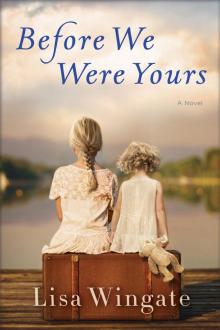 Before We Were Yours
Before We Were Yours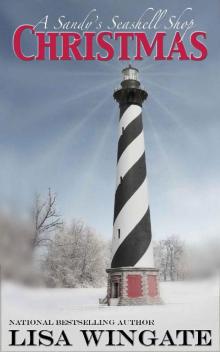 A Sandy’s Seashell Shop Christmas
A Sandy’s Seashell Shop Christmas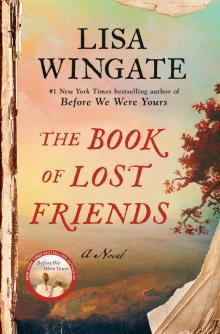 The Book of Lost Friends
The Book of Lost Friends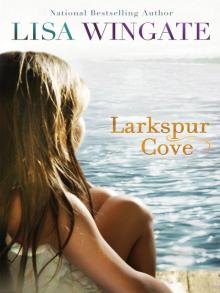 Larkspur Cove
Larkspur Cove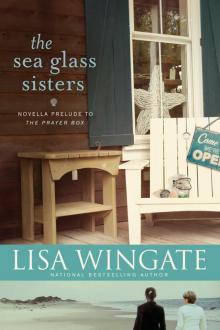 The Sea Glass Sisters
The Sea Glass Sisters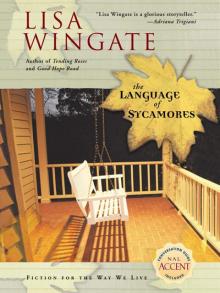 The Language of Sycamores
The Language of Sycamores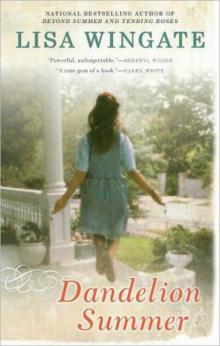 Dandelion Summer
Dandelion Summer Word Gets Around
Word Gets Around Beyond Summer
Beyond Summer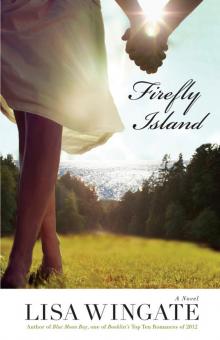 Firefly Island
Firefly Island The Tidewater Sisters: Postlude to The Prayer Box
The Tidewater Sisters: Postlude to The Prayer Box Talk of the Town
Talk of the Town![Blue Sky Hill [01] A Month of Summer Read online](http://i1.bookreadfree.com/i1/03/29/blue_sky_hill_01_a_month_of_summer_preview.jpg) Blue Sky Hill [01] A Month of Summer
Blue Sky Hill [01] A Month of Summer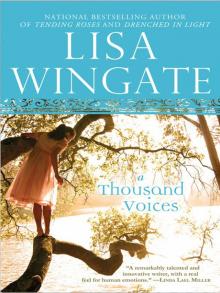 A Thousand Voices
A Thousand Voices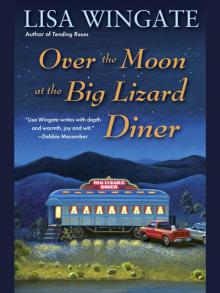 Over the Moon at the Big Lizard Diner
Over the Moon at the Big Lizard Diner Never Say Never
Never Say Never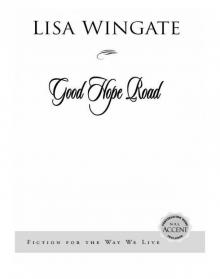 Good Hope Road
Good Hope Road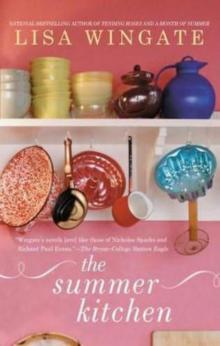 The Summer Kitchen
The Summer Kitchen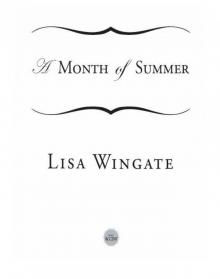 A Month of Summer
A Month of Summer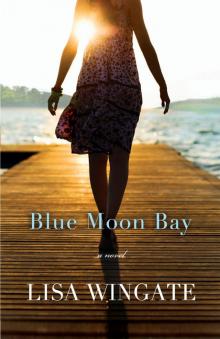 Blue Moon Bay
Blue Moon Bay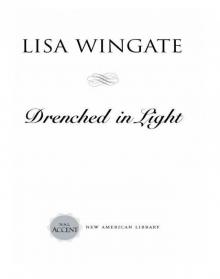 Drenched in Light
Drenched in Light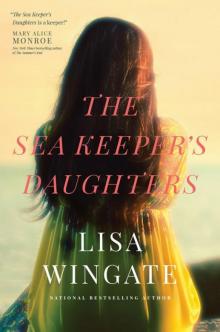 The Sea Keeper's Daughters
The Sea Keeper's Daughters